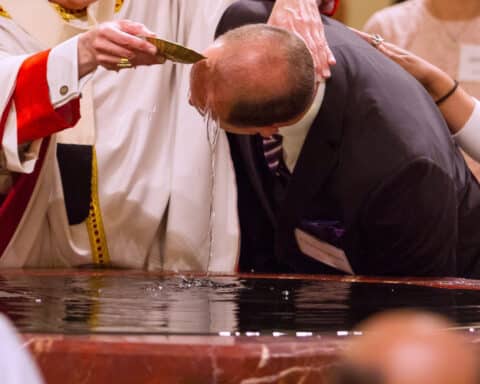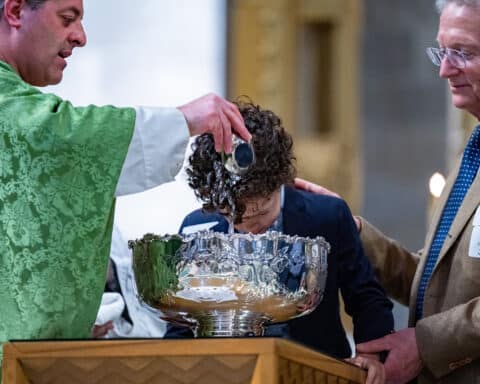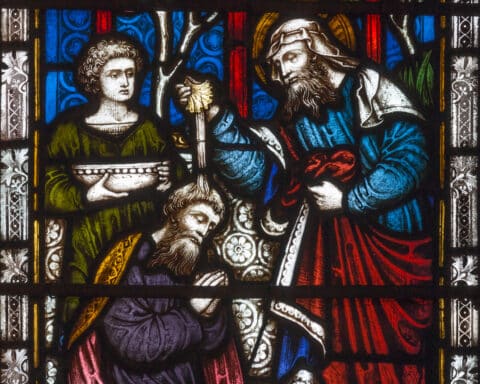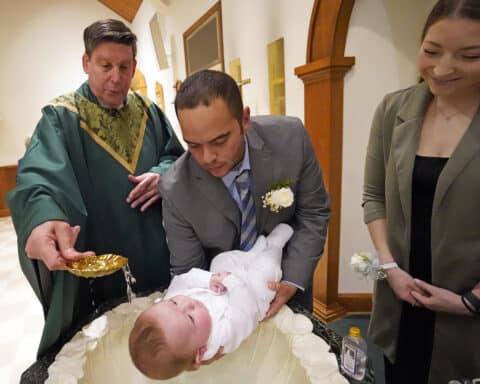
— Name, location withheld
Answer: Generally, the Church holds that infants and young children should not be baptized without the consent of the parents and their promise to raise the children in the Catholic faith. However, it remains the case that, at times, grandparents or a spouse, against the wishes of the parents or other spouse, baptizes a child in spite of opposition. As long as the baptism is conducted with proper matter and form and is in accord with the intentions of the Church, the baptism is valid. The matter is the pouring over or immersion into water of the child with the form (or words): “I baptize you in the name of the Father and of the Son and of the Holy Spirit.” If this is done, the baptism is valid.
The Church seeks to uphold the authority of parents, but when other family members step in, this is not wholly rejected, either. A relative who follows proper matter and form does in fact convey a sacrament. If a priest hears of this, he ought to collect the information and properly record it in the baptismal register. A careful inquiry ought to be conducted, and only when it is clear that a valid baptism has been conducted should the priest enter such a record.
There are other circumstances where a layperson can and should baptize. For example at an accident scene or a hospital setting where one is dying and clergy cannot be sought in time, it is important that laypeople conduct an emergency baptism. If the person is an adult who has previously rejected invitations of the Church, one can still conduct a baptism and leave final judgments to the Lord, but only if the conscious rejection of the person is still in place. In “danger of death” scenarios where a patient is unconscious, a lot of canon law legal observations are set aside. God alone knows if the person, confronted by death, was still unwilling to be baptized, and he alone will judge their situation. The Church can only do what she is told to do (i.e., baptize) and leave the rest to God.
In conclusion, grandparents and others, generally speaking, ought not interfere with the decisions of parents. However, when they do, the Church does not regard their actions as invalid, but must seek to enroll any and all valid baptism into the records of the Church.
Drinking like a Catholic
Question: How do I “drink like a Catholic”? It seems like some people think that drinking what they want as a rejection of the puritan attitude toward alcohol should be rejected altogether. But I don’t think alcohol should be rejected altogether. Jesus turned water into wine and consecrated wine, after all.
— Name, location withheld
Answer: You are correct, Catholics are not puritans. However, we all know from experience that things like alcohol and food must be sought in moderation. Regarding alcohol, just beyond exhilaration is inebriation. Finding that spot, where enough is attained to relax and too much has been consumed such that one is impaired mentally and physically, is difficult. History and collective experience has shown that alcohol consumption is difficult to regulate and moderate. Of itself, there is nothing intrinsically evil or wrong with spirits or wine. Scripture says, “You make … wine to gladden their hearts, oil to make their faces shine, and bread to sustain the human heart” (Ps 104:14-15). Jesus drank wine and was accused of being a drunkard, though he was not (cf. Lk 7:33-34). And yes, it is true, that Jesus made wine in abundance at the wedding feast of Cana.
So, we are left with a matter that is not intrinsically evil but must be moderated. Puritan extremism must not demonize what God has made to bless us. But neither should we indulge what God has made and thereby corrupt what is good in itself. Many are able to do this, but there are some who struggle with alcohol and have addictive tendencies. In such cases, even in smaller quantities, alcohol can lead addicts to need more and more alcohol to bring the relaxation they seek. At some point, one is impaired and can no longer resist excessive consumption. In this case, God’s gift, no longer received with moderation, must be excluded.
Msgr. Charles Pope is the pastor of Holy Comforter-St. Cyprian in Washington, D.C., and writes for the Archdiocese of Washington, D.C. at blog.adw.org. Send questions to msgrpope@osv.com.





